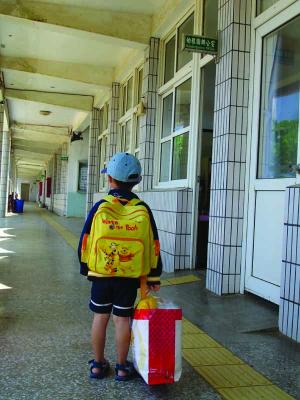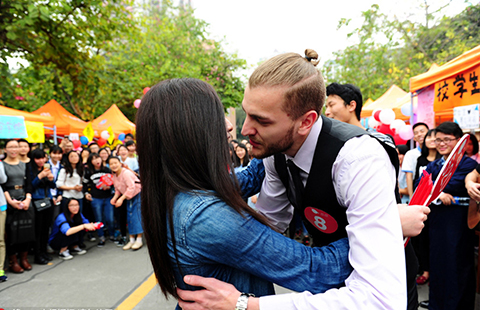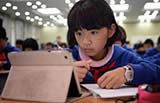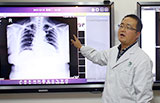Let the children speak
(China Daily Asia Weekly) Updated: 2012-09-20 14:29It's been common practice that when parents are divorced, those who perhaps are most profoundly affected by the separation are given no voice: the children. There is growing sentiment in Hong Kong, however, that children should be heard in divorce cases, so that their best interests may be served.
When Po Yan-cheng's parents finally divorced, she felt relieved. Only 16 at the time, she still recalls thinking: finally, after all these years.
The divorce had been pending for more than a decade. The first time the discussion came up, Yan-cheng had just been enrolled in primary school.
|
 |
|
Hong Kong's divorce rate has been climbing fast to between 30 and 40 in recent years. [Photo provided to China Daily] |
For the next 10 years, she stood on the sidelines, a spectator to the bitter battles fought by her mother and father. Several times her parents got close enough to end their marriage, all they would have needed was to sign their names.
Now 21 and just graduated from university, she recalls those ugly years that were like a dark cloud over most of her childhood and teenage years.
Today, she feels she has found peace and takes a rational view of what took place, with an aura of maturity beyond her years.
"I felt helpless. I didn't know whom to talk to. I wanted to help. I wanted to change the situation. But I didn't know how ... One thing that I hated most was, I felt that I was just their bargaining chip. It was like, whoever gets the custody rights wins the war," Po said.
She was not a kid who would bury her head and withdraw into a world of her own. When she was going to secondary school she would imagine herself standing before a judge settling the custody dispute herself.
"Since you two are fighting for me, why not just let me make the decision?"
Po didn't make it to court nor did she meet the judge. She felt helpless in the recognition of how little she could do, even though very much a participant in her parents' divorce.There was no forum for her to speak her views.
Many people still hold the view that a divorce is the two people who want to separate and that the involvement of their kids should be held to a minimum.
"It's possible that a child may have no idea of what happened and how things are arranged from the beginning to the end," she said, after carrying out her own review of Hong Kong's Family Law.
Po and two of friends, law student Hercules Lai and 14-year-old Heidi Cheng are making it their crusade to work for change. Not only do they want to affect a change in legislation but public perception as well.
The three met through Kids' Dream, a child-led non-profit organization that advocates Children's opinions. Lai also went through his parents break-up when he was a teenager. "In all circumstance I would never ever live with my dad," he said immediately, with some heat, when asked about his family situation. "I am an individual. I wanted to be part of the process determining my future," he said.
Cheng grew up in a happy family but has seen close friends in school suffering through the divorce of their parents. "I want to help, to do something," she said.
After digging into lots of legal documents and looking into overseas statutes, the three young people came up with a proposal.
They suggest that a Child Advocate should be appointed in divorce cases where children are involved. The Child Advocate would be responsible for informing children about the procedures of the divorce and help fill in a Survey of Wishes, a questionnaire designed to reflect what the child wants. They suggest such a survey result must be submitted along with other required documents with the initial petition or joint application for divorce.
"So far, very little public attention has been given to this issue," Po said.
In fact, in as early as 2005, the Law Reform Commission published a report Child Custody and Access to propose a new "joint parental responsibility model" into Hong Kong's Family Law. The new model emphasized the continuing parental responsibilities of both parents even after the divorce is final.
There were 12 recommendations out of 71 in the report aimed at ensuring that children are heard during family proceedings, including making children's views a statutory factor for the court to consider children's best interests. The report called for a strengthening of current provisions relating to separate representation for children, and proposed a more clearly defined set of criteria applying to the appointment of a legal representative. The proposal was meant to bring family law up to date, to reflect present day thinking. Now, it's seven years later, and very few of the recommendations have been adopted.
This year may mark significant progress in the campaign for reform. Two guidance notes have been issued, with the intent to ensure that children’s voices are heard in the course of proceedings.
The directive, Guidance on Meeting Children, designed for the judges took effect on May 2. The explanatory note to the document stated that one of the most challenging decisions facing Judges in civil matters involving children, is whether it is appropriate to interview a child. Now clear instructions and guidance are provided. Guidance on Separate Representation for Children in Matrimonial and Family Proceedings comes into effect in less than two weeks, on October 3. The document states that children may be presented by an appointed guardian ad litem through a solicitor. That means a child could have a lawyer to represent his views in legal proceedings, and his interests can be actively pursued throughout the proceedings.
Family lawyer Winnie Chow of Hampton, Winter and Glynn believes the two documents will bring a change to Family Law, "which I think is a positive change," she told China Daily.
Currently, in most cases, children's views are passed on to the court only through the reports of social workers. Now there are two additional means, she explained.
Over the past decade lawyers have tried to arrange children to meet with judges. It still has not come into common practice and often is not entertained by the judges, she said.
"Traditionally judges take a paternalistic approach that they shouldn't meet with children and draw the kids into the conflict. But modern approach is a recognition of a child’s right to freely express his or her views and the right to have some input in the consideration process." Chow believes the new guidance will help clear doubts so that more judges become willing to meet children directly. The family lawyer with 11 years in practice, noted an increasing awareness of children's rights.
She has handled cases and seen all kinds of parents. But one thing she has noticed is "parents in Hong Kong are more open-minded now. They no longer consider their children as property, but as a person with rights". "From an adult's perspective, or from the family court's perspective, nowadays we have more regard to children's rights," she added. "The right to be involved, not necessarily the right to decide."
But as the old saying goes, every coin has two sides. Giving children a voice may put them deeper into a power struggle, when the parents realize their children also have a say. "Parents should never see it as an opportunity to manipulate their children," Chow warned, "they should see it an invaluable opportunity to see it from their children's perspective that they may have overlooked."
That's also Linda Chew's concern. "The more weight accorded to the children's stated preference, the greater the risk of children being manipulated or pressured by parents," said the senior clinical psychologist of the Social Welfare Department. Her special interest is in the area of custody evaluations, and divorce issues.
Her rich clinical experiences of over 20 years caution her that the words of children have to be interpreted very carefully. The cases she has reached may not be the most typical, they could even be considered the worst, the most difficult ones. "In high-conflict cases, each parent is usually experiencing very strong emotional up and downs. They may act through extremes. We can't blame them too much," she said.
As a clinical psychologist, Linda has many different methods to ascertain the child's true feelings, including protective tests such as drawing. Sometimes she simply observes their behavior carefully. Over the years she says she has seen too many family tragedies. She noted that it has been proven that the negative affect of a parental split on children is not really the divorce itself, but the intense conflicts and compromised parenting. "Kids may feel like they are victims, they don’t have a say."
She advises parents to talk to their children, tell them what they should know, and listen to them.
"One of the most common misunderstandings, is that parents think their children know nothing. But actually even small kids can sense something is wrong," she added.
Hong Kong's divorce rate has been climbing fast to between 30 and 40 in recent years. In a still conservative society like Hong Kong, the soaring number highlights the urgent need for updated legislation — letting children engage in a process that involves them so deeply, said Po Yan-cheng.
- 2030 emission goal 'reasonable' - top climate negotiator
- Granting longer visas for foreign experts eyed to ease entry
- Repentant convicts in Xinjiang get sentence reductions
- Tibet hoping to become a top global destination
- Cases of illegal GM crops 'under control'
- Fujian to blaze trail for reforms
- Premier: No giving up on growth
- Planner rules out hard landing
- Diplomacy the key for peaceful coexistence
- Minister: China can absorb laid-off labor







